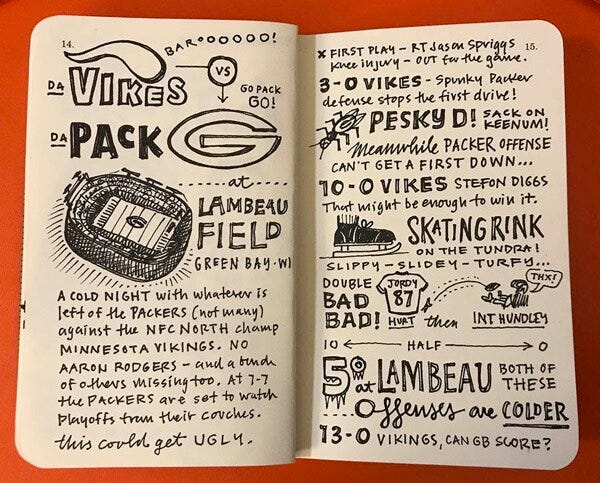
Since coining the term sketchnote in 2007, I've conducted numerous experiments using sketchnotes to determine their place in my life.
During that time, I’ve noticed three keys to creating better sketchnotes.
1. Keep an open, positive mindset
More than drawing ability, an open, positive mindset is the foundational key to sketchnoting. It's an openness to learning new things. It's the power to see things differently, to choose what you capture, and how to draw it out on the page.
You've limited your possibilities if your mindset is closed to new ideas.
I'm a Green Bay Packers fan, and a few seasons ago, my team was terrible without our star quarterback or a good defense. Facing a lost season, I exchanged the serious sketchnotes I used to take for a loose, humorous style for my game sketchnotes.
I had fun sketchnoting games again. Now, I see my sketchnoting practice differently because my mindset was open to change.
If you change your mindset to a positive, open one, your sketchnoting will improve because you’ll be curious and open to possibilities.
2. Believe you already have what it takes
Wherever your drawing quality is at, it’s good enough to start. It may not be as good as you want it to be, but my goodness, it can always improve. It’s good enough.
I say “Ideas, Not Art” because it reframes a student's perspective from “I can't draw because I must create gallery-ready artwork” to “I can draw to communicate ideas.”
We have everything we need to communicate visually. Some are further ahead than others, but I have seen the roughest, most rudimentary sketches communicate ideas more effectively than beautiful artwork from talented artists.
We tell ourselves stories about what we can and can't do. One of those stories is that we can't draw. But we can control this by changing our perspective.
If you change your perspective from needing to draw like DaVinci to that of a child trying to communicate, you’ll be good enough to begin simple drawings.
3. See each sketchnote as an experiment
Every time you sketchnote, you’re running an experiment. It's an opportunity to learn and play with new approaches. You win when you push yourself a little and learn something new.
If you're too focused on sketchnoting as a performance—to be seen and judged by others—it can freeze your flow. You can lose spontaneity and start worrying about failing and messing up.
When everything you do becomes an experiment, every failure or success becomes a learning opportunity.
My growth-improving jumps have come when I’ve pushed myself (or have been pushed) to experiment with ideas that might fail.
I often learn the most from mistakes. Our job is to be gracious to ourselves and learn from them.
Live football game sketchnotes were an experiment that I started in 2015. I wondered, “Could I capture my experience of a game visually?”
When the team played poorly, the experiment changed to “Can I loosen my approach to having fun with the process?”
That's why I tell people that sketchnotes are first for themselves and then for others. Once we sense that this work will be judged, we tend to clam up and worry about mistakes: mis-spellings, running out of space, or drawing badly.
Maybe we don't have to share everything with the world. Try getting loose and keeping a few experiments for yourself for a while.
Change your approach to improv comedy and avoid creating a perfectly scripted comedy film. Experiment with sketchnoting and have some fun!




Great advice Mike. Something I've been interested in recently is doing "bad" things because doing something the wrong way reveals something you'd never see doing it the right way. It also helps me get past that inner censor who doesn't want to look silly even if its just in front of myself.